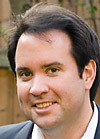
I teach Christian ethics at Fordham University in the Bronx. My academic work focuses in biomedical ethics, but I’m also very interested in the confluence of ethics, theology and politics in our public sphere more broadly. I’ve spent considerable time working to find ways to dial down the polarization in our public sphere and fruitfully engage difficult issues like abortion, euthanasia, treatment of non-human animals, and health care distribution. They key, it seems to me, is intellectual solidarity with those who think differently.
My early work focused especially on medical and clinical ethics with regard to stem cell research and the focus of my first book was treatment of critically ill newborns and just distribution of health care resources. My second book took intellectual solidarity in a new direction: engaging Princeton’s Peter Singer. Christian ethics are thought to be diametrically opposed to his work, but my thesis in the book was that this polarized understanding is a mistake. A close, charitable reading of the two approaches shows that they are similar enough for both fruitful, critical correlation. Indeed, I argue that we can work together for peace and justice on several different issues.
My third book, released on the feast of St. Francis in 2013, is for a broader audience and asks difficult questions about our relationship with non-human animals. Should Christians eat meat? Is cooperation with factory farming evil? Should Christians hunt? Use drugs and other medical therapies that were produced by the intense suffering of animals? These are difficult, complex matters–but Christians ought to be far more engaged with them than we have been.
In addition to serving on the ethics committee of the Children’s Hospital of New York, I’m also serving as the founder and co-director of the Catholics Conversation Project, and with an international three year working group Muslim and Catholic bioethicists called “Contending Modernities.”
